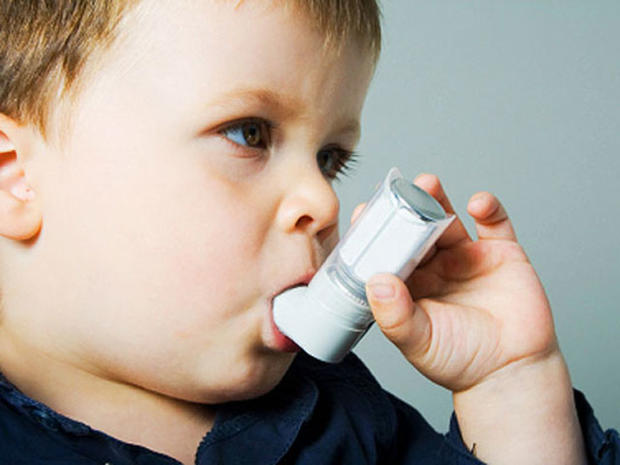Mild-to-moderate asthma sufferers may not benefit from daily dose of steroids
(CBS News) A new study shows that mild-to-moderate asthma sufferers may not need a daily dose of steroids, information that may revolutionize treatment for people with the disease.
Researchers at the University of Texas Medical Branch at Galveston discovered that patients who used corticosteroids prescribed daily to control their symptoms did not show any more improvements in their condition compared to those who only used the medication when they were having an attack.
"The discovery that these two courses of treatment do not differ significantly could eventually change the way doctors and patients manage asthma, providing an option that is easier to follow and possibly less expensive," lead author Dr. William J. Calhoun, professor and vice chair for research in internal medicine at UTMB, said in the press release. "Our findings build on a considerable foundation of research in the field and come at a time when asthma cases are rising at an alarming rate - especially in lower-income communities."
According to the National Heart, Lung and Blood Institute, asthma affects 25 million people in the United States, including 7 million children. The chronic lung disease inflames and narrows airways, causing wheezing - a whistling sound when breathing - chest tightness, shortness of breath and coughing. There can be a number of triggers including environmental and genetic factors. The researchers added that asthma costs about $3,300 per person each year in medical expenses, missed days of school and work and early deaths.
The study, published in the Sept. 12 issue of JAMA, looked at 340 adult patients with mild-to-moderate persistent asthma who were put on one of three different treatment methods: physician-assessment-based adjustment (PABA), in which doctors adjust medication doses based on symptoms with rescue use of albuterol and pulmonary function at six-week intervals; symptom-based adjustment (SBA), in which inhaled steroid medication is taken only when attacks occur and the third type, biomarker-based adjustment (BBA), in which a patient's levels of exhaled nitric oxide are watched regularly.
Over nine months, the researchers tested for bronchial reactivity, lung function, and recorded days missed from school/work and exacerbation of symptoms and asthma attacks. They discovered that there was no difference in any of the asthma sufferers no matter which treatment method they were on and whether they used the steroids daily or when they had attacks.
Treatments were also shown to have an annual 5 percent failure rate, with an increase to 10 percent in the autumn and winter. The doctors felt failures went up at that time because of factors including the seasonal changes and increase of allergens, mold, pollution and viral diseases.
However, Dr. Len Horovitz, a pulmonary specialist at Lenox Hill Hospital, in New York City, told HealthDay that getting asthma patients to take their medication regularly is already a problem, telling them to only have it on hand when they have an attack may be a bad thing. If they use it regularly, they may already be in the habit of taking the medication, he said. Horovitz was not involved in the study.
"While a symptom-based strategy for asthma treatment worked for some patients, and is an attractive idea because it can work, it requires a close monitoring and collaboration between doctor and patient," he said. "For this reason, on balance, the traditional approach of daily inhaled corticosteroids is the safest."
Dr. Homer Boushey, a longtime asthma researcher at the University of California, San Francisco who was involved in the study, added to WebMD that these results shouldn't be considered for people who have severe asthma.
"People underestimate the severity of their disease," Boushey said. "This is really only for people with truly mild disease."

